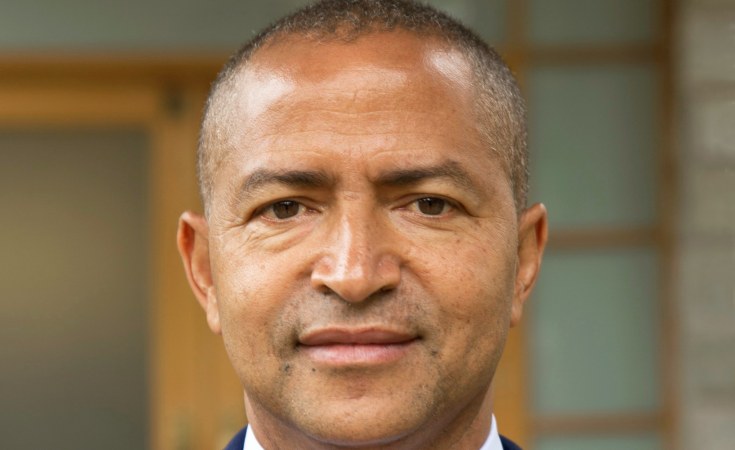Analysts fear that a lack of democratic culture among candidates running in the Democratic Republic of the Congo's 2023 presidential election could further deteriorate the security situation in a country beset by crises.
Moise Katumbi, the prominent politician, businessman and soccer official, said on Saturday that he would run for president in the 2023 election in the Democratic Republic of the Congo (DRC) . The announcement had been widely expected.
He tweeted that it marked the end of his alliance with President Felix Tshisekedi, to enable him "to serve the Congolese."
"I want to build a just state, an exemplary republic, where everyone can live in security and dignity from the fruits of their labor," he added.
In order to signal that he was the right person to achieve these aims while resisting the temptations of power, the next day Katumbi posted a picture of himself arm in arm with Mo Ibrahim, the British-Sudanese mobile phone billionaire, whose foundation promotes good governance in Africa.
'Rushed' schedule
Katumbi thus launched the hot phase in the struggle for political power in Kinshasa.
The DRC's electoral commission (CENI) only recently published a tight schedule for the realization of general elections.
Voter registration is supposed to start three days from now. "It's rushed," a commission member admitted to DW.
Donatien Nshole, secretary general of the influential Catholic National Episcopal Conference of the Congo, agreed. CENCO is acting as an election observer. Nshole said the important thing now is to avoid disagreements. "Otherwise, a small slipup, or a wrong choice of words, could quickly turn into a major crisis."
Bad memories
Elections in the DRC come fraught with bad memories. In 2016, then President Joseph Kabila reached the end of his constitutionally allowed terms. But he kept postponing elections, which finally took place two years later, after massive pressure from civil society. The intervening repressive period was marred by the death of dozens of people in protests.
Katumbi, a former governor of the southeastern province of Katanga who enjoyed high popularity, had, by then, announced his candidacy. The Kabila camp took thinly disguised measures to neutralize his rival.
These included several court cases that forced the opposition politician into exile. His identity papers were voided, preventing him from returning to the country to file his candidacy.
More dangerous, perhaps, was a debate over Katumbi's ethnicity, which has now been revived by Tshisekedi's UDPS party.
"The population will have to choose between someone who has something to show, who has kept his promises, and someone whose true nationality is in question," said UDPS spokesperson Thierry Monsenepwo.
"According to certain sources, Katumbi is descended from a Jewish-Italian father and a Zambian mother," he added.
What political culture?
Congolese cleric and analyst Alain-Joseph Lomandja said these debates were upsetting. While democratization has been progressing since 1990, "more than thirty years later, I don't feel we have true democratic politicians," he told DW.
The fact that a ruling political party has allowed itself to be tied to statements of this kind is cause for concern, he said. They encouraged intolerance and antisemitism.
Lomandja pointed out that lack of democratic culture was not restricted to the president's camp. His challenger, Katumbi, nominated himself presidential candidate days before his party's congress, which was left with the task to confirm the decision.
"Even though we now have political parties, they do not function in a democratic manner," Lomandja said. "Often, the founders of a party finance it themselves, and manage it as they see fit."
Another contender in the presidential race is Martin Fayulu, Tshisekedi's most significant challenger after Katumbi. The latter supported him in the 2018 elections, after he was prevented from running.
At the time, analysts expected Fayulu to win the election by a clear margin. Observers also saw him ahead in the race. Ultimately, the electoral commission proclaimed Tshisekedi the winner, which came as a surprise to almost everybody and cast doubts on the credibility of the results.
Suspicion of collusion between the new and old presidents raised further questions. To this day, Fayulu sees himself as Kabila's rightful successor -- a view he reaffirmed in an interview with DW in November.
The crisis in eastern Congo
The RDC ranks fourth on a worldwide list of countries most severely hit by crises, compiled by the International Rescue Committee. The IRC expects the political situation to deteriorate in the election year.
To make matters worse, the DRC also must deal with a security crisis in the east. M23 is one of the militias still active in the region, although its defeat was announced years ago. The rebel group is believed to be responsible for one of the worst massacres in Congolese history, in late November, in a suburb of Goma, the provincial capital of North Kivu.
As candidates line up, the electoral commission faces the mammoth task of enabling all voters to participate. It's something that greatly worries analysts like Ithiel Batumike from the Ebuteli Research Institute.
"Population groups living in areas controlled by M23 could end up by being excluded from the polls," Batumike told DW, adding that access to the region could even require the rebels' authorization.
Jean-Noel Ba-Mweze, Paul Lorgerie and George-Ibrahim Tounkara contributed to this article.
This article was originally written in German.


